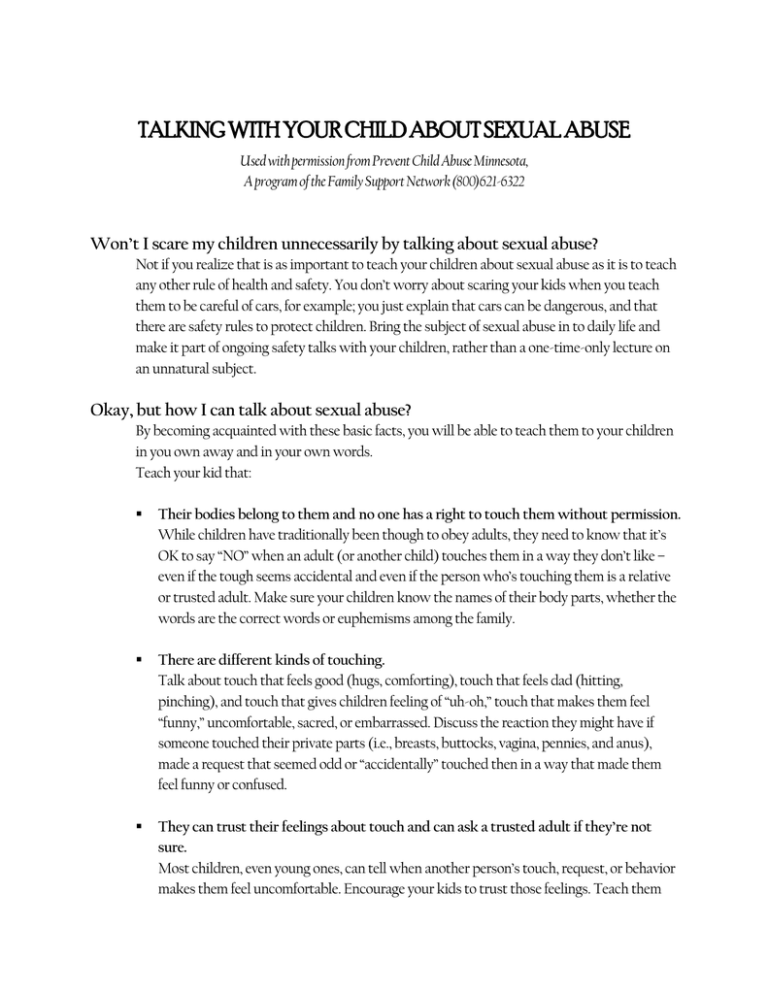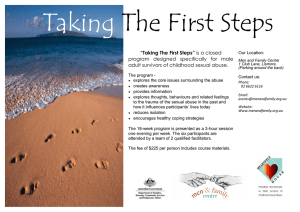
TALKING WITH YOUR CHILD ABOUT SEXUAL ABUSE
Used with permission from Prevent Child Abuse Minnesota,
A program of the Family Support Network (800)621-6322
Won’t I scare my children unnecessarily by talking about sexual abuse?
Not if you realize that is as important to teach your children about sexual abuse as it is to teach
any other rule of health and safety. You don’t worry about scaring your kids when you teach
them to be careful of cars, for example; you just explain that cars can be dangerous, and that
there are safety rules to protect children. Bring the subject of sexual abuse in to daily life and
make it part of ongoing safety talks with your children, rather than a one-time-only lecture on
an unnatural subject.
Okay, but how I can talk about sexual abuse?
By becoming acquainted with these basic facts, you will be able to teach them to your children
in you own away and in your own words.
Teach your kid that:
Their bodies belong to them and no one has a right to touch them without permission.
While children have traditionally been though to obey adults, they need to know that it’s
OK to say “NO” when an adult (or another child) touches them in a way they don’t like –
even if the tough seems accidental and even if the person who’s touching them is a relative
or trusted adult. Make sure your children know the names of their body parts, whether the
words are the correct words or euphemisms among the family.
There are different kinds of touching.
Talk about touch that feels good (hugs, comforting), touch that feels dad (hitting,
pinching), and touch that gives children feeling of “uh-oh,” touch that makes them feel
“funny,” uncomfortable, sacred, or embarrassed. Discuss the reaction they might have if
someone touched their private parts (i.e., breasts, buttocks, vagina, pennies, and anus),
made a request that seemed odd or “accidentally” touched then in a way that made them
feel funny or confused.
They can trust their feelings about touch and can ask a trusted adult if they’re not
sure.
Most children, even young ones, can tell when another person’s touch, request, or behavior
makes them feel uncomfortable. Encourage your kids to trust those feelings. Teach them
TAKING WITH YOUR CHILD ABOUT SEXUAL ABUSE –Page 2
the “No, Go, and Tell” Steps –yell “No!” when they are touched inappropriately, get away
from the person who touched them, and tell a trusted adult about it right away. Play a
“what if” game for practice.
For example, you can say:
o “What if someone put his had on your bottom?”
o “What if someone wanted you to take your clothes off without a good reason (i.e., a doctor’s visit)?”
o “What if someone followed you home from school?”
Together you can brainstorm some possible responses –such as yelling “No! I don’t like
that!” and/or running away to tell a trusted adult.
You and other trusted adults will listen to them and believe them.
Make sure your kids know they will not be punished or “in trouble” if they tell when
something happened that made them feel uncomfortable. Since sexual abuse feels shameful,
kids often assume their parents will be angry at them if they tell. Reassure them that
they’re not at fault. And support their autonomy: if Johnny doesn’t want to give Grandma a
hug, don’t make him. It’s better to let Grandma’s feelings be hurt than to teach Johnny that
adults can force him to tough when he doesn’t want to be touched.




